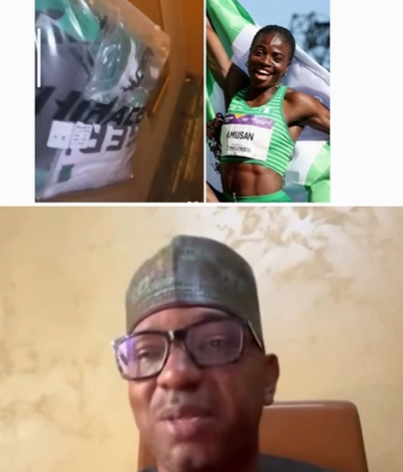Nigeria’s build-up to the ongoing 2025 World Athletics Championships in Tokyo, Japan has been overshadowed by a heated row over the quality of kits supplied to the national team, with star hurdler Tobi Amusan and the country’s sports authorities taking opposing positions.
Former world champion and women’s 100m hurdles record holder, Tobi Amusan, sparked the storm after posting a viral video on social media where she lamented the “inferior kits handed to Nigerian athletes.
Amusan, visibly disappointed, described the situation as yet another embarrassing episode for Nigerian sports, questioning why a country of Nigeria’s stature continually falls short in supporting its athletes.
This country will steadily embarrass you, she said in frustration, pointing to the subpar quality of the gear compared to those of their global rivals.
Her comments quickly gained traction online, with many Nigerians rallying behind her and demanding accountability from the government and sports authorities.
In response, Shehu Dikko, Chairman of the National Sports Commission (NSC), dismissed Amusan’s criticism as inaccurate.
Those kits are not inferior or whatever people are trying to say. If you look at other countries, they are using similar kits. It is just probably about the packaging because it was not put in a box or not bought in bulk, he explained.
While expressing admiration for Amusan, Dikko urged Nigerians not to see her complaint as the full picture: I don’t want to go into Tobi personally; she is our star athlete.
I respect her a lot, and we honor her. She did the video it is what it is, but it is not the case that the kits are substandard.
Beyond the kits, critics have also accused the Nigerian delegation in Tokyo of being overloaded with government officials and aides, rather than athletes.
While some fans allege that political figures are enjoying the spotlight at the expense of sportsmen and women, Dikko also dismissed this concern, insisting the delegation was properly constituted.
Despite Dikko’s defense, the backlash has not subsided. Amusan’s complaint echoes longstanding frustrations among Nigerian athletes over poor welfare, inadequate preparation, and logistical lapses that often plague the country at major competitions.
Analysts note that similar issues arose during the Tokyo 2021 Olympics and the 2022 Commonwealth Games, when athletes publicly criticized the government for lack of support.
For many observers, the kit controversy goes beyond fabric quality: it symbolizes the persistent disconnect between Nigeria’s sporting authorities and the athletes who bring global recognition to the country.
Nigeria has pledged to reposition sports as a driver of national pride and economic development under President Bola Tinubu’s administration. Yet, incidents like this cast doubt on those promises and fuel calls for deeper reforms in sports administration.
As Amusan continues her campaign in Tokyo, fans hope her performance on the track will not be overshadowed by off-field drama. But the episode has once again reignited the national debate on how Nigeria treats its sporting heroes.



